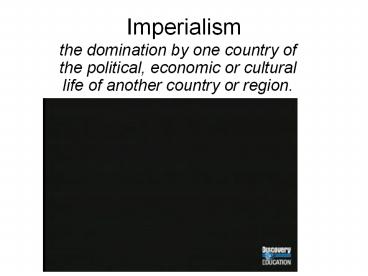Imperialism - PowerPoint PPT Presentation
Title:
Imperialism
Description:
Imperialism the domination by one country of the political, economic or cultural life of another country or region. Reasons for its spread From 1870 to 1914: strong ... – PowerPoint PPT presentation
Number of Views:127
Avg rating:3.0/5.0
Title: Imperialism
1
Imperialism
- the domination by one country of the political,
economic or cultural life of another country or
region.
2
Reasons for its spread
- From 1870 to 1914 strong economies due to the
Industrial Revolution, strong central
governments, and a sense of superiority amongst
European nations (Social Darwinism). - Economy Need for raw materials (rubber,
petroleum, manganese, palm oil), markets for
finished goods, and places to invest capital. - Political and Military
- Needed places and materials to re- supply ships.
- Prestige and a limit on the territory controlled
by ones enemies. - Humanitarian
- White Mans Burden- doctors, missionaries,
officials. - Social Darwinism- the belief that Whites are the
superior race and must impose their ways on all
others.
3
Why didnt they other places fight back?
- 1. Their empires were in decline at that time-
Ottoman Empire in Middle East, Mughal India, Qing
China, West African kingdoms. - 2. Europeans had better weapons (Maxim Machine
gun, repeating rifles, and steam warships) also
had medicines to help them survive in tropical
climates where they couldnt before. - 3. some places tried but werent very successful-
it did lead to independence movements later on.
4
Forms of Imperialism
- colonies
- direct- sent French officials to rule the new
land enforce their culture. - b. indirect- British used local officials, but
had their children educated in England. - 2. Protectorates use of local officials who
follow orders from the colonial power- esp. trade
and missionaries. - - cost less to run than a colony and didnt
require direct military support. - 3. spheres of influence economic imperialism-
the area of a country (China) can ONLY trade with
a certain European power. - - Latin America was a US sphere of influence.
5
Spreading Christianity was still important.
6
Effects of Imperialism
The majority of changes were enforced from the
Europeans (and Americans) to the subject
nations of Asia, Latin America, and Africa
- Economic to social changes
- The natural resources from colonies were
developed in mines and on plantations-gt they were
paid in wages (cash economy instead of barter)-gt
people purchased food which they used to grow,
and finished goods which they could no longer
make themselves (cloth in India)-gtcolonial
economies were dependent on the global market for
their goods-gt people were taxed to pay for
colonial government-gt didnt make enough money to
support their families-gt families were split up
as men or daughters were sent off to work
elsewhere-gt traditional life and values eroded.
7
Effects of Imperialism
- Economic benefits
- The colonial powers set up the modern banking
system and brought technology and communication
and transportation systems.
8
Effects of Imperialism
- Cultural Impact
- modernization westernization- people began to
devalue their own traditions and culture. - - began to speak, dress, educate, and act
western to succeed. - - some people still resisted Westernization and
kept to traditional lifestyles. - education, medicine, religion- brought by
missionaries (converted or blended), trained
people for jobs, increased life expectancy, but
undermined local teachers and healers. - Western society increased its reliance on
nonwestern goods, became aware of its history and
literature, adopted some of its fashions and
music.
9
Effects of Imperialism
- Political Impact
- The colonial powers forcibly brought together
many historically warring groups, leading to
relative stability. - Eventually the educated children of the
Non-westerners would develop nationalism and call
for independence, which competed with the
increasing hostility between European powers over
claims for colonies-gt this would be a major
factor in the outbreak of WWI.
10
Cartoon 1
11
Cartoon 2
12
Cartoon 3
13
Cartoon 4































